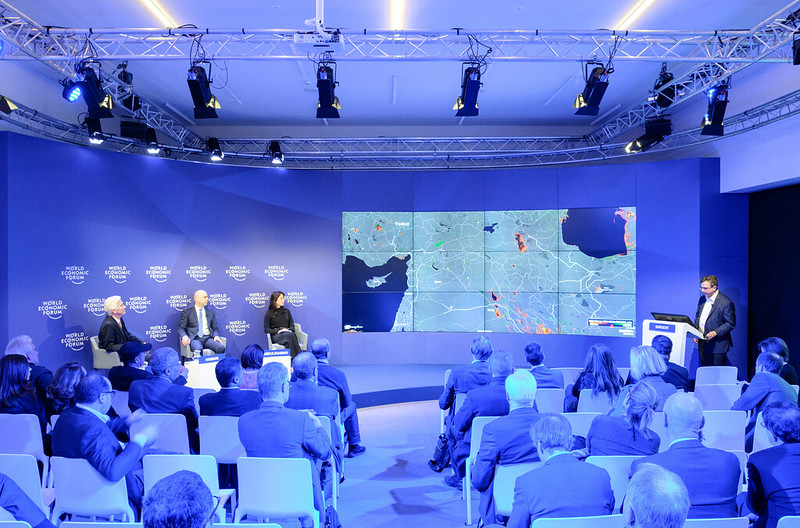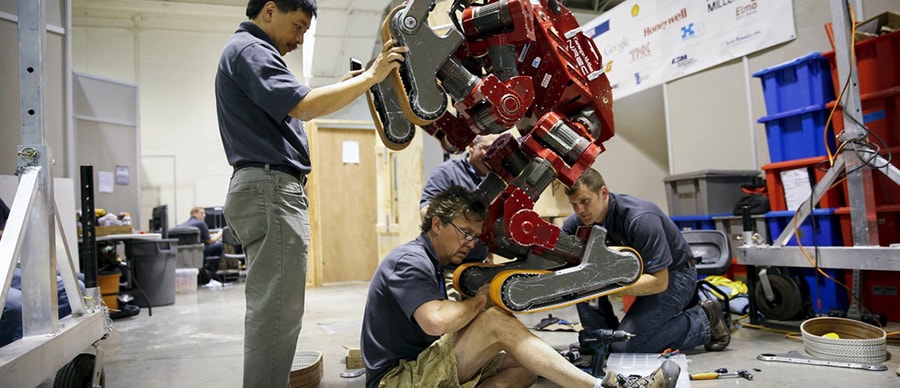CMU Experts Lead Conversations at World Economic Forum
By Laura Kelly

A contingent of Carnegie Mellon University faculty, led by Interim President Farnam Jahanian, engaged in conversations about how big data and artificial intelligence are changing the world at the 2018 World Economic Forum in Davos, Switzerland last week.
This year's theme, "Creating a Shared Future in a Fractured World," aimed to rededicate international leaders from across industries and disciplines to develop a shared narrative to improve the world.
"Carnegie Mellon is proud to have demonstrated our distinct expertise at the nexus of technology, business and human life at the World Economic Forum in Davos this year," Jahanian said. "Our outstanding faculty presenters and panelists showed the global community that we not only pursue solutions to the world's most critical challenges, but we are also passionately committed to fostering access and broad societal inclusion in the Fourth Industrial Revolution, a theme of this year's events."
Professor Marios Savvides discusses how iris and face recognition may help reunite displaced families and refugees with former UN Secretary-General Kofi Annan. #CMUatWEF pic.twitter.com/OrNNQhESms
— Carnegie Mellon (@CarnegieMellon) January 27, 2018
Among those innovators and scholars were faculty members Rita Singh, Marios Savvides and Jean Yang, who collaborated for an IdeasLab presentation, "Ultra-Biometrics and Cybersecurity with Carnegie Mellon University."
It was very exciting for Professors Marios Savvides and Jean Yang (@jeanqasaur) to meet H.R.H. Princess Beatrice of York, hear about her work in artificial intelligence, and tell her about their work! #CMUatWEF #Davos2018 pic.twitter.com/pWT2YbQhp3
— Carnegie Mellon (@CarnegieMellon) January 23, 2018
Singh, an associate research professor in the Machine Learning for Signal Processing Group, discussed her research, which allows for the pinpointing of people and insights into their biological makeup and surroundings through voice recognition.
#CMUatWEF features faculty members talking about their latest research. Here, Rita Singh discusses #VoiceForensics with @hubculture. Follow #WEF18 throughout the week for the latest. https://t.co/BaYpem6xgv
— Carnegie Mellon (@CarnegieMellon) January 22, 2018
Savvides, director of CMU's CyLab Biometrics Center, shared his research in advanced facial recognition technology, including iris detection.
Here is the conceptual illustration of the Davos IdeasLab talk “Ultra-Biometrics and Cybersecurity” that @SCSatCMU professors Rita Singh, Marios Savvides, and @jeanqasaur gave this morning at @wef #CMUatWEF #davos2018 pic.twitter.com/OaPIK7r8NL
— Carnegie Mellon (@CarnegieMellon) January 26, 2018
Professor Marios Savvides, who does research on biometrics, talks to @Walmart CEO Greg Foram about his work. #CMUatWEF #Davos2018 pic.twitter.com/UrNF9Ex636
— Carnegie Mellon (@CarnegieMellon) January 23, 2018
Jean Yang, an assistant professor in the School of Computer Science, shared her research in encoding privacy frameworks and how to make them accessible to all. One of the pillars of her research that was discussed during the IdeasLabs was increasing security.
"Software is running more and more of our lives," Yang said. "It's deciding everything from where we eat to who we date to what disease we get diagnosed with to how it gets treated."
Interim President Farnam Jahanian, CMU Trustee Francisco D’Souza & @iamwill discuss robotics, AI & opportunities for STEM education for underserved communities at the “Rethinking Leadership in the Digital Age” event, sponsored by Manpower Group at @wef #CMUatWEF #Davos2018 pic.twitter.com/A4QYrYKCNo
— Carnegie Mellon (@CarnegieMellon) January 24, 2018
Randy Sargent, senior systems scientist at CMU, sat on several panels focusing on pollution, biodiversity loss, global inequality, ending modern slavery, and historical trends and emerging geographic patterns behind the world's pressing challenges.
Live examples of #migration flows, #water reduction & #climate change over time in #MiddleEast by #RandySargent @CarnegieMellon Brilliant wt the Earth Time maps @wef #WEF18 pic.twitter.com/ma7ZxwpdU8
— Jean Lebel (@_JeanLebel) January 25, 2018
Illah Nourbakhsh, a professor in the Robotics Institute at CMU, discussed how to meet the needs of all within a growing global trade, geospatial technology, autonomous drones, and how to address global hunger and food security as a panelist at the Forum. Former Vice President Al Gore delivered the closing remarks of the session.
Again this year, the CREATE Lab at the Robotics Institute's billboard-sized EarthTime display was a popular draw among Forum attendees.
Justine Cassell, a professor in the Human-Computer Interaction Institute, gave solo presentations, "Governing Advanced Technologies: Machine Learning" and "Global Tech, Local Solutions: Artificial Intelligence." In "Machine Learning," Cassell addressed how machine learning will soon be used everywhere and discussed what first principles should shape its governance. In "Artificial Intelligence," closing the gaps in access to information and smart algorithms were discussed.
Professor @jeanqasaur (@SCSatCMU) attends the ETH Zurich and Google reception to learn about some of the coolest technology in Switzerland. #CMUatWEF #Davos2018 pic.twitter.com/K5ZEjwFGLU
— Carnegie Mellon (@CarnegieMellon) January 23, 2018
In addition to IdeasLab, Singh, Savvides and Yang delivered solo presentations throughout the conference.
Formal talks are only a part of the Davos experience. Participants said informal interactions are an important part such as an extended conversation between CMU Trustee and CEO of Cognizant Francisco D'Souza, President Jahanian and musician will.i.am.
CMU also hosted a reception attended by many Davos participants including U.S. Labor Secretary Alexander Acosta.
This story was updated on Jan. 29.
